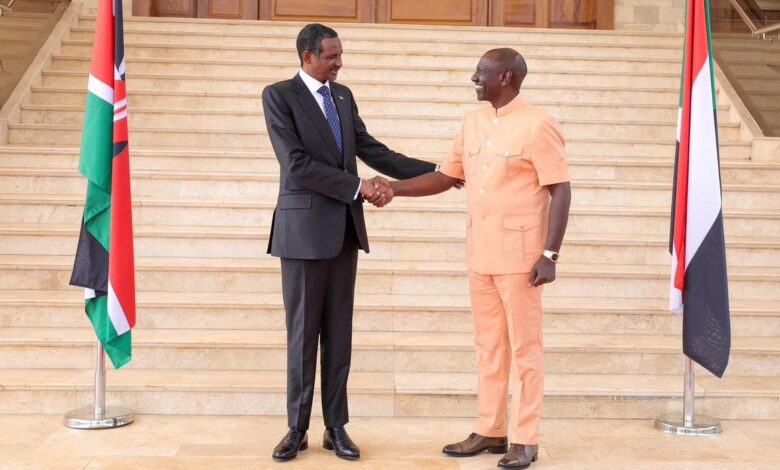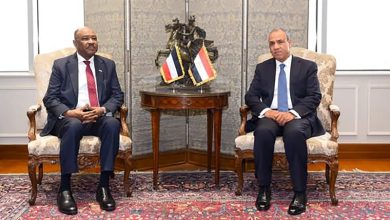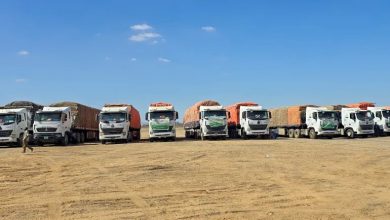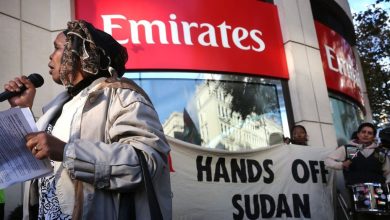Kenya… Suspicious Roles

Sudan Events – Agencies
The language used in the official statement by the spokesperson of the Sudanese Ministry of Foreign Affairs regarding Kenya’s hosting of a meeting for forces advocating the establishment of a charter to form a government in areas controlled by the Rapid Support Forces (RSF)—a meeting that was postponed from last Tuesday to the evening of Friday, February 21—clearly signals not only Sudan’s dissatisfaction with the Kenyan government’s stance but also other immediate concerns related to the ongoing war in Sudan.
The United Arab Emirates, as part of its broader support and sponsorship of the rebellious RSF militia, has managed to forge an African alliance comprising Sudan’s neighboring countries (Chad, Central Africa, Ethiopia) and extended neighbors (Kenya, Uganda) to back the militia and tighten the noose around the Sudanese government. Kenya’s hosting of the political charter meeting for the so-called “Government of RSF-Controlled Areas” falls within the agenda of paid-for support, financed in U.S. dollars or its equivalent in UAE dirhams.
Kenya: A Black Record and Dark History
Sudanese-Kenyan relations have historically been marked by continuous deterioration since the late 1950s and early 1960s, primarily due to Nairobi’s direct interference in Sudanese affairs. Kenya has consistently supported (South Sudanese) rebel movements—when South Sudan was still part of Sudan—by providing them with significant military, logistical, and media support, as well as opening training camps for their forces.
Despite this dark history, Kenya was ironically the regional mediator and sponsor of negotiations between the Sudanese government and the Sudan People’s Liberation Movement (SPLM) in Machakos and Naivasha. This role raised eyebrows among observers, who later realized that Kenya’s dual role—supporting the rebellion while mediating peace talks—was a carefully orchestrated strategy leading to South Sudan’s eventual secession.
Thus, it comes as no surprise that Nairobi is now hosting the meeting to announce the “Government of RSF-Controlled Areas,” aligning perfectly with the larger project of dividing the Arab world, a scheme backed by major powers to strengthen Israel’s dominance by implementing the “New Middle East Project.” What has transpired in Iraq, Yemen, Syria, and Lebanon is merely a continuation of this plan—executed on behalf of Israel by the UAE, whose top officials in Tel Aviv have acknowledged its role as “Israel’s legitimate proxy.”
Former Israeli Prime Minister Golda Meir, in her memoirs, spoke of Israel’s dream of establishing a proxy state following the 1967 war—a vision realized with the emergence of a new state in the early 1970s.
Relations on Life Support
Kenya’s hosting of the charter-signing meeting for the RSF-controlled government undoubtedly places Sudanese-Kenyan relations on life support. The Sudanese Foreign Ministry’s statement contained clear indications that Sudan would not remain passive in response to Nairobi’s actions, emphasizing that “not every time does the free woman escape unscathed.”
Kenya’s historic support for rebels is no longer something Sudan can afford to ignore, especially now that Sudan is engaged in an existential battle for survival.
No Room for Silence
The Sudanese Foreign Ministry’s statement explicitly described Kenya’s actions as a blatant violation of international norms and the principles governing inter-state relations. The United Nations Charter and the African Union’s governing framework classify such actions as subject to international accountability, as they constitute interference in the affairs of member states of international and regional organizations.
This situation necessitates intensified diplomatic efforts to halt such irresponsible actions by the Kenyan government, which has a long history of interfering in Sudanese affairs. Kenya is now facilitating a meeting backed by a rebellious militia seeking to declare so-called “liberated areas”—territories that are either already reclaimed by the Sudanese army and its allies or on the verge of being retaken, even in Darfur.
In Darfur, local communities that were initially coerced or persuaded into siding with the RSF militia are now revolting against it. They have realized that the militia has merely led their youth to death and destruction in the fires of war.
Source: “Sudanese Echoes”



